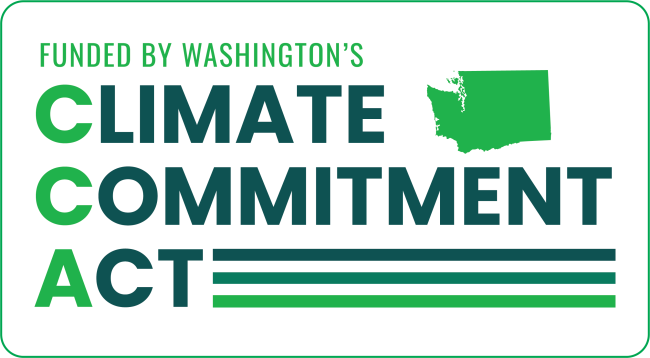State Buses and Bus Facilities
State Buses and Bus Facilities grants provide funding to transit agencies for replacement, expansion, rehabilitation, and purchase of transit rolling stock; construction, modification, or rehabilitation of transit facilities; and funding to adapt to technological change or innovation through retrofitting of transit rolling stock and facilities.
This grant is supported by state funding from Washington’s Climate Commitment Act (CCA) (100 percent). The CCA supports Washington’s climate action efforts by putting cap-and-invest dollars to work reducing climate pollution, creating jobs, and improving public health. Information about the CCA is available at www.climate.wa.gov.

This grant is established under the 16-year Move Ahead Washington transportation package and codified in RCW 47.66.130.
Grant award amount
The Legislature funded $37,999,972 for the 2025-2027 biennium to support this program.
Eligible applicants
Any transit agency in Washington state is an eligible applicant. A transit agency is defined as:
- City transit system under RCW 35.58.2721 or chapter 35.95A RCW.
- County public transportation authority under chapter 36.57 RCW.
- Metropolitan municipal corporation transit system under chapter 36.56 RCW.
- Public transportation benefit area under chapter 36.57A RCW.
- Unincorporated transportation benefit area under RCW 36.57.100.
- Special purpose district formed to operate a public transportation system.
Eligible projects and related costs
Capital projects and related expenditures may include:
- Replacement, expansion, rehabilitation, and purchase of transit rolling stock.
- Construction, modification, or rehabilitation of transit facilities.
- Funding to adapt to technological change or innovation through the retrofitting of transit rolling stock and facilities.
Match requirement
Applicants must provide matching funds in the form of direct contributions at a certain percentage of total project costs. Direct contributions are cash or assets that directly benefit the project and are fundamental to implementing the project.
The State Buses and Bus Facilities Grant program uses a tiered match system to determine the minimum required match an applicant must provide. Match is determined by the transit agency's most recent operating budget.
| Tier level | Operating budget | Required match |
|---|---|---|
| Tier 1 | $35 million or more | 20 percent |
| Tier 2 | $20 million to $34.9 million | 15 percent |
| Tier 3 | $10 million to $19.9 million | 10 percent |
| Tier 4 | $5 million to $9.9 million | 5 percent |
| Tier 5 | Less than $4.9 million | No match required |
Previous eligible expenditures directly associated with the proposed project may qualify as match. Applicants may use other grants as match except for competitive state-funded grants administered by WSDOT’s Public Transportation Division.
Evaluation process
WSDOT uses a competitive process for awards from the State Buses and Bus Facilities Grant program that includes a panel of subject matter experts to review and evaluate applications.
Evaluation criteria
An independent review panel will evaluate applications based on the following evaluation criteria:
- Demonstration of need, including how the project meets agency state-of-good-repair goals, how it meets safety goals, and how it addresses environmental harms and provides environmental benefits for overburdened communities and vulnerable populations.
- Demonstration of benefits, including measurable outcomes that improve the quality or scope of service in the community.
- Local/regional prioritization.
- Project implementation strategy, including the demonstrated readiness of the project for implementation.
- Project experience.
Sign up for grant updates
To stay informed about WSDOT public transportation grants, you can register in GovDelivery.
Awards
The table below illustrates nine new State Buses and Bus Facilities projects funded for nearly $38 million and awarded for the 2025-2027 biennium.
| Organization | County/counties | Project title | Award |
|---|---|---|---|
| Grays Harbor Transportation Authority | Grays Harbor | Headquarter's right-of-way, permitting, and final design project | $6,030,000 |
| Jefferson Transit Authority | Jefferson | Electric dial-a-ride replacement vehicle | $137,750 |
| King County Metro Transit | King | Bellevue base bus lift systems replacement | $3,445,786 |
| Kitsap County Public Transportation Benefit Area Authority | Kitsap | Battery electric bus and inductive charging fleet conversion project | $11,200,000 |
| Pierce County Public Transportation Benefit Area Corp. | Pierce | Maintenance and operations base rehabilitation, including zero-emission infrastructure | $696,168 |
| Skagit Transit System | Skagit | Maintenance, operations, and administration facility replacement, phase 2 construction and expansion paratransit coach | $7,771,250 |
| Skagit Transit System | Skagit | Replacement of four heavy-duty coaches | $3,529,624 |
| Snohomish County Public Transit Benefit Area Corp. | Snohomish | DART paratransit replacement vehicles | $1,913,600 |
| Valley Transit | Walla Walla | New vehicle barn capital construction project | $3,275,794 |
Slow down – lives are on the line.
Excessive speed was a top cause of work zone collisions in 2024.
Phone down, eyes up.
Work zones need our undivided attention.
It's in EVERYONE’S best interest.
96% of people hurt in work zones are drivers, their passengers or passing pedestrians, not just our road crews.
